The project of deregulation of long-distance transport promoted by the Government breaks with the logic of the sector as a public service. Scope had access to a draft of the decree that could be published in the next few days: it opens the doors to new operators with practically zero requirements, eliminates the obligation to use terminals and reduces controls. They warn about the risks of road safety, connectivity and the growth of shady businesses.
According to the details of the document circulating in the Casa Rosada, the objective is “launch a broad program to transform the national transportation system, aimed at rationalizing the service offering, expanding investments and reducing costs”The sector understands that the magnitude of deregulation is such that it would imply a paradigm shift in which long-distance transport will cease to be a public service.
In that case, concepts such as obligation and regularity would become abstract. Companies may stop connecting destinations that are not profitable for them. Argentina is the eighth largest country on the planet, has a very low population density, only 55 airports and a railway network that has been in disrepair for decades. There are hundreds of towns and cities that can only be reached by bus.
public transport.jpeg
Ignacio Petunchi
The text to which this medium had access is based on the mega DNU of December 20, 2023, which in its article number 2 provides that the State “will promote and ensure the effective validity, throughout the national territory, of an economic system based on free decisions.” What the Minister of Deregulation and Transformation of the State, Federico Sturzenegger proposes completely dismantling the current regulatory framework.
Road safety
According to what he was able to find out Scopethose who want to register in the new registry that arises from the decree, will be able to do so with practically any vehicle authorized to transit, although they could still exempt cars. In this way any transport with more than eight seats would be allowed to make long-distance journeys on a regular basis.
With the regulations that the Government wants to implement, controls would practically disappear because article 18 establishes that “Vehicles will be able to start their journey, make stops to pick up and drop off passengers at any location”With infinite departure and arrival points, the operations that are currently carried out routinely at the terminals would be weakened.
These are not the only points of concern for road safety. A change in the maximum speeds allowed would also be triggered.which are currently lower for buses. With deregulation, they would be brought under general regulations. This is something that even the companies in the sector reject.
The accident figures are alarming. For example, in the City of Buenos Aires, during the month of August, SAME intervened in 1,590 traffic incidents, an average of 51 per day, which is equivalent to one every 28 minutes. The Civil Association Madres del Dolor believes that before deregulating, more attention must be paid to what is happening with this phenomenon. They had meetings with Sturzenegger regarding other projects of the minister.
Opaque business
Which players will be interested in entering the sector? It is not clear, the decline in demand is 30% year-on-year. But if you look at it in historical terms, since the regulatory opening From 1992 until now, the number of annual passengers has declined from 50 million to 25 million annually.
The sector does not receive state subsidies. The price level does not seem to be excessively high, a ticket from Buenos Aires to Rosario can be purchased for $12,000 and the barriers to entry into the business are not low.
Industry sources with whom he spoke Scope They pointed out their concern that deregulation could create room for growth in shady businesses. In July alone, two events were recorded that were practically identical: transporters coming from the northern border were stopped at roadblocks, the passengers were dropped off and their vehicles were set on fire before the search could take place.
A bus of this type costs more than US$200,000. The question is: What kind of activity do they engage in that makes it more interesting to destroy the vehicles before they are inspected?
Doubts about the transport deregulation plan
All this is not clear What will happen to people with disabilities?Since it is a public service, companies are obliged to transport them free of charge, but if it is deregulated they could be left helpless.
There is also no certainty about how insurance will work under the new scheme; currently there are only three companies (mutuals) that work with long-distance transport. Doubts.
The logic that Sturzenegger conveys to his interlocutors is that the regulation as it is does not work, so it is better to eliminate it. This argument overlooks one detail: that things could always be worse.
Source: Ambito




